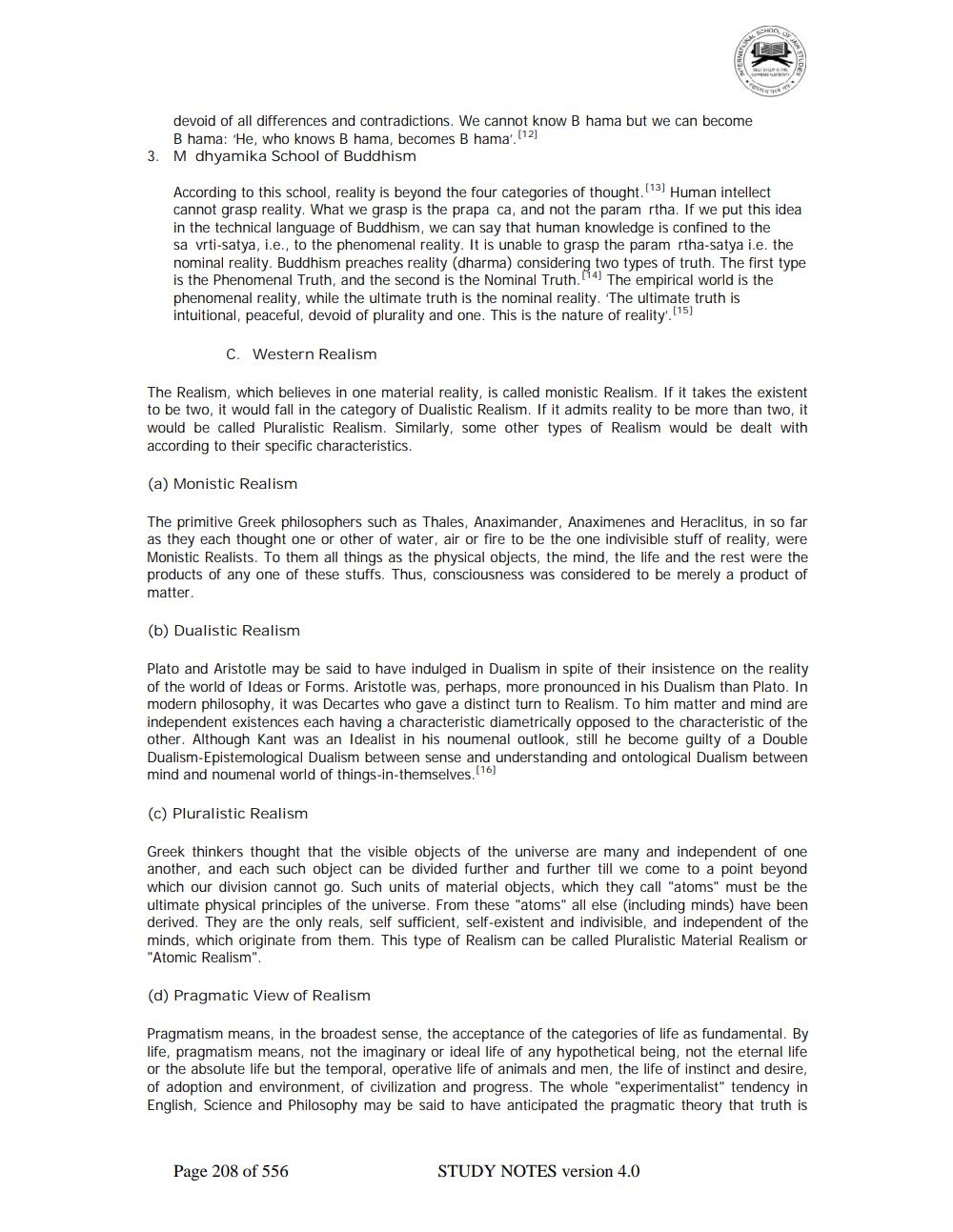________________
devoid of all differences and contradictions. We cannot know B hama but we can become B hama: 'He, who knows B hama, becomes B hama'. [12]
3. M dhyamika School of Buddhism
According to this school, reality is beyond the four categories of thought. [13] Human intellect cannot grasp reality. What we grasp is the prapa ca, and not the param rtha. If we put this idea in the technical language of Buddhism, we can say that human knowledge is confined to the sa vrti-satya, i.e., to the phenomenal reality. It is unable to grasp the param rtha-satya i.e. the nominal reality. Buddhism preaches reality (dharma) considering two types of truth. The first type is the Phenomenal Truth, and the second is the Nominal Truth. [4] The empirical world is the phenomenal reality, while the ultimate truth is the nominal reality. The ultimate truth is intuitional, peaceful, devoid of plurality and one. This is the nature of reality'. [15]
C. Western Realism
The Realism, which believes in one material reality, is called monistic Realism. If it takes the existent to be two, it would fall in the category of Dualistic Realism. If it admits reality to be more than two, it would be called Pluralistic Realism. Similarly, some other types of Realism would be dealt with according to their specific characteristics.
(a) Monistic Realism
The primitive Greek philosophers such as Thales, Anaximander, Anaximenes and Heraclitus, in so far as they each thought one or other of water, air or fire to be the one indivisible stuff of reality, were Monistic Realists. To them all things as the physical objects, the mind, the life and the rest were the products of any one of these stuffs. Thus, consciousness was considered to be merely a product of matter.
(b) Dualistic Realism
Plato and Aristotle may be said to have indulged in Dualism in spite of their insistence on the reality of the world of Ideas or Forms. Aristotle was, perhaps, more pronounced in his Dualism than Plato. In modern philosophy, it was Decartes who gave a distinct turn to Realism. To him matter and mind are independent existences each having a characteristic diametrically opposed to the characteristic of the other. Although Kant was an Idealist in his noumenal outlook, still he become guilty of a Double Dualism-Epistemological Dualism between sense and understanding and ontological Dualism between mind and noumenal world of things-in-themselves.[16]
(c) Pluralistic Realism
Greek thinkers thought that the visible objects of the universe are many and independent of one another, and each such object can be divided further and further till we come to a point beyond which our division cannot go. Such units of material objects, which they call "atoms" must be the ultimate physical principles of the universe. From these "atoms" all else (including minds) have been derived. They are the only reals, self sufficient, self-existent and indivisible, and independent of the minds, which originate from them. This type of Realism can be called Pluralistic Material Realism or "Atomic Realism".
(d) Pragmatic View of Realism
Pragmatism means, in the broadest sense, the acceptance of the categories of life as fundamental. By life, pragmatism means, not the imaginary or ideal life of any hypothetical being, not the eternal life or the absolute life but the temporal, operative life of animals and men, the life of instinct and desire, of adoption and environment, of civilization and progress. The whole "experimentalist" tendency in English, Science and Philosophy may be said to have anticipated the pragmatic theory that truth is
Page 208 of 556
STUDY NOTES version 4.0




